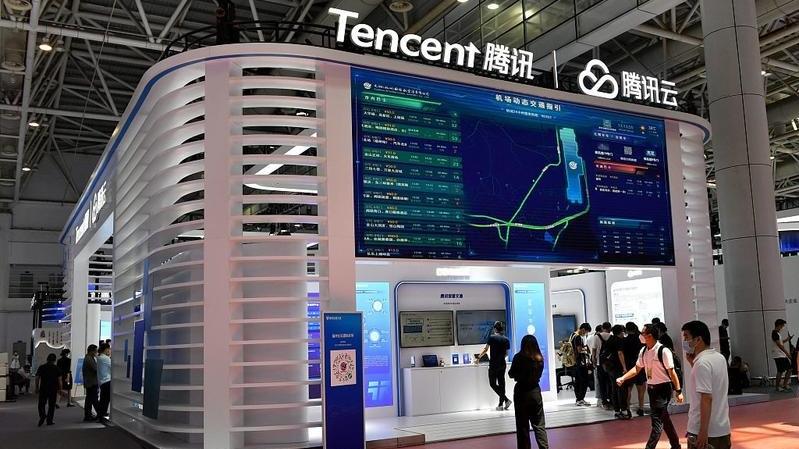 This July 22, 2022 file photo shows that visitors gather at the booth of the Tencent Cloud during an expo in Fuzhou, Fujian province. (PHOTO / VCG)
This July 22, 2022 file photo shows that visitors gather at the booth of the Tencent Cloud during an expo in Fuzhou, Fujian province. (PHOTO / VCG)
Chinese mainland internet conglomerate Tencent Holdings is putting an emphasis on business optimization and efficiency improvements after the technology giant’s net profit was dragged down by a decline in last year’s mainland game revenue and its cloud business affected by the COVID-19 pandemic.
In the conference call after the announcement of its annual results on Wednesday, Tencent Co-Founder, Chairman and Chief Executive Officer Ma Huateng reiterated that technology companies have always needed to strengthen their structures and improve efficiency.
“Tencent will be willing to try in expanding new businesses, but the company should focus on the core business and should not diverge resources. There are no specific indicators for making business adjustments and business size reductions, and business efficiency will be evaluated from the gross profit and per capita efficiency ratio of various businesses,” Ma said in the call.
Tencent Executive Director and President Martin Lau Chi-ping added that Tencent’s organizational optimization was more or less completed last year, and it is expected that the optimization will enhance internal awareness of cost controls and efficiency improvements.
“I believe that there is room for further improvement in existing businesses, and the company can utilize existing manpower and resources when developing new businesses,” he said.
The company said its profit attributable to equity holders dropped to 188.2 billion yuan ($27.35 billion) for the year ended December 2022, a 16 percent decline from the previous year’s 224.8 billion yuan, but better than the median forecast of 108.3 billion yuan. The company’s non-IFRS profit attributable to shareholders decreased 7 percent to 115.6 billion yuan. Revenues dipped 1 percent to 554.5 billion.
Tencent reported a final dividend of HK$2.40 (30 cents) per share, an increase of 50 percent from the previous year.
The company said its commercial payment business was temporarily impacted by COVID-19 outbreaks in the fourth quarter of 2022, resulting in a significant slowdown in volume growth. It further reduced loss-making activities and optimized costs, while focusing on self-developed video cloud and database solutions which can enjoy higher margins.
“We are investing in our artificial intelligence capabilities and cloud infrastructure to embrace foundation models. Looking ahead, we will continue to seek (ways of) creating user value, commercial value and social value via technology and innovation,” Ma said in the Wednesday company statement.
The company is applying AI capabilities to industrial scenarios such as industrial quality inspections and intelligent manufacturing, as well as to other scenarios such as medical care, elderly care, biodiversity protection, and agriculture. Last year, the company’s annual research and development expenditure reached 61.4 billion yuan. Since 2019, Tencent’s cumulative R&D expenditure has exceeded 182.6 billion yuan.
A research report note from Jefferies Hong Kong said that the future profit performance of Tencent will hinge on the following factors: consumer behavior after the reopening of the mainland economy; domestic games industry outlook and updates about gaming approvals; impact of global macro headwinds on gamers’ spending; advertising outlook and trends across different industry categories that affect the monetization of video accounts; fintech revenue trend and regulatory trends; and the company’s cloud investment strategies.


